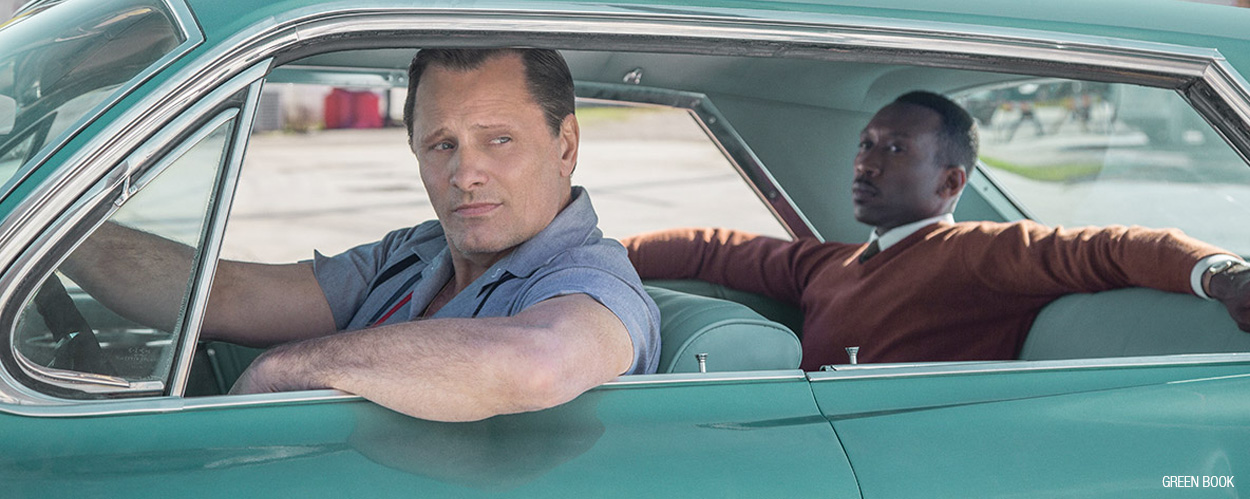
Why Music Films Score Big At The Oscars
by Luke Parker (5/30/2019)
Every year, the Academy of Motion Picture Arts and Sciences offers two awards directly for music in its Best Original Song and Score categories. But a look back at some of the Oscar’s past contenders and winners suggests that the Academy also holds in high regard those films that can convincingly capture and portray any aspect of the musician experience.
Be it the sullen journey to stardom (Inside Llewyn Davis, 2 nominations) or perfection (Whiplash, 5 nominations, 3 wins), or a glimpse into some of the perks (A Hard Day’s Night, 2 nominations) or consequences (Walk the Line, 5 nominations, 1 win) upon reaching celebrity, films whose rich stories delve deep into some part of the musician’s mind are often recognized.
And it makes sense. If immersion is the filmmaker’s goal for the audience, that is, the fading away of the real world to make way for the compelling one onscreen, the successful binding of these two long-standing art forms is quite the achievement. With that said, 2018 featured several films that achieved such experiences, all of which have been repeatedly heralded throughout the award season. They are Green Book, Bohemian Rhapsody, and A Star is Born. While each one tells a separate story, many themes and styles cross over between them, as do the categories in which they’re nominated.
Green Book, perhaps the least musicoriented film of the bunch, given its general focus on racial disparities, tells the story of jazz pianist Don Shirley (Mahershala Ali) and the Italian driver he hires (Viggo Mortensen) to chauffeur his tour through the 1960s South.

The Freddie Mercury biopic Bohemian Rhapsody thrillingly chains together the rock-and-roll timeline of the legendary band Queen and their super singer (Rami Malek) with the extravagancies and consequences of his equally audacious life offstage.
And finally, A Star is Born, actor Bradley Cooper’s directorial debut and heavy award contender, parallels the spiraling out of his own character Jackson Maine, a rock-country singer, with the rise of Lady Gaga’s Ally, a young, promising singer/songwriter.
While each of these films are showing up time and time again in the best picture categories across the various award shows, with Bohemian Rhapsody (drama) and Green Book (comedy or musical) recently winning the big prize at the Golden Globes, a far more contentious battle emerges between them in the various acting categories. Among the most common victors and heavy contenders are, coincidentally, the primary musical performers in each production: Ali, Malek, and Gaga.
What each actor has brought to these roles is different in each case, but commonalities can be traced between them as well as those which have taken home Academy Awards in the past. For example, the most obvious trait shared between the performances of Ali and Malek is the fact that they are the subjects of biopics, attempting to recreate the past experiences of – especially in Malek’s case – well-known performers.
Obviously banked on their ability to transform their stories into the sincerest, often tributary, and most genuine form of realism, successful biopic performances are often the recipients of Oscar nominations and wins. This year, though it is not a music biopic, Christian Bale is also receiving accolades for his utterly convincing performance as Dick Cheney in Vice, as are John David Washington in BlacKkKlansman, and Melissa McCarthy in Can You Ever Forgive Me?
But there is more that goes into the performances that make up a music biopic, especially to those actors who are not well known or bred for their musical abilities. For these performers have the daunting task of not only convincing audiences and probable fans of the subject that who he or she becomes on the screen is the popular persona they’re familiar with, but also making sure that the art of the subject and the presentation of it fades away and becomes the actor’s own.
Bohemian Rhapsody specifically joins films like Ray, which stars Jamie Foxx (win) as Ray Charles, and Walk the Line, which stars Joaquin Phoenix (nominated) and Reese Witherspoon (win) as Johnny and June Carter Cash, in crafting such a necessarily persuasive recreation. What Foxx, Phoenix, and Witherspoon bring to their films with the use of their actual singing voices and learned instrument talents Malek more than makes up for in his own onstage charisma as Mercury. His florescent movements and wonderfully whacky mannerisms are so far beyond mesmerizing that the actor manages to blend into the role of one of the most unique and outstanding performers in rock history.
But when it comes to building and managing the environment of the music industry onscreen, the task is equally as important for those films whose narratives are fictitious. Gaga, whose vocal abilities are not lost upon many, and Bradley Cooper join those few actors above in lending their own voices to A Star is Born, and even their own tunes (with the duet “Shallow” looking to guarantee Gaga at least one Oscar win).

Of course what is most impressive and different about Gaga’s performance is the flipping of the responsibilities from the other actors who work within the genre. Unlike, say, Jeff Bridges in his Academy Award-winning performance in Crazy Heart, Gaga the singer had the even more dismaying task of proving herself as an actress. Fortunately for her, the rise-to-fame story of A Star is Born is perfectly suited for such a re-introduction.
Whether it is the execution of a convincing glissando on the piano, or the ability to capture the thrill and electricity of the onstage performance (both in Bohemian Rhapsody’s 10-15-minute Live Aid re-creation and those several scattered throughout Cooper’s production), the success of performances like these allow music films to manufacture the necessarily balanced visual/auditory experience. With such a dependability on these few factors, who can blame the Academy for taking notice when a film does them right?
Interested in These Movies?
Luke Parker is an award-winning film critic and columnist whose work on We Got This Covered is regularly featured on Rotten Tomatoes and Metacritic. Now an Assistant Manager, he has been an employee at Cinemark Towson for over a year.


